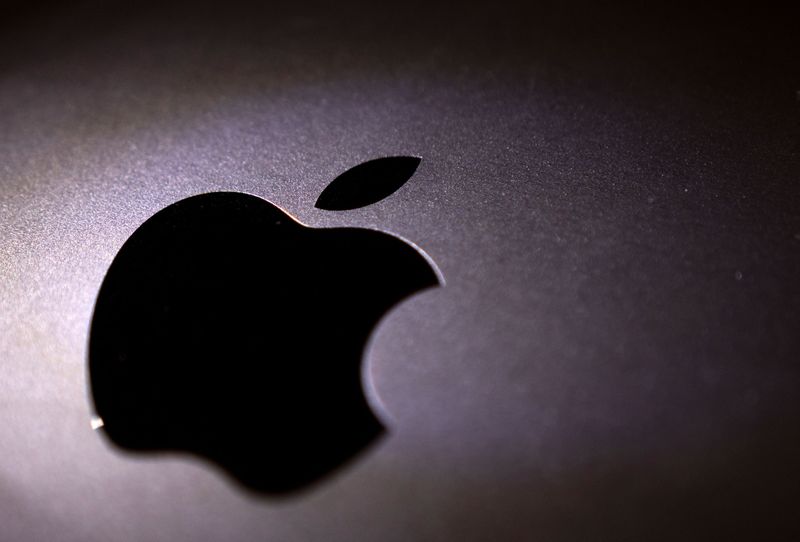Apple presses U.S. lawmakers on dangers of ‘sideloading’ apps allowed by bill By Reuters
[ad_1]
 © Reuters. Apple logo is seen in this illustration taken March 1, 2022. REUTERS/Dado Ruvic/Illustration
© Reuters. Apple logo is seen in this illustration taken March 1, 2022. REUTERS/Dado Ruvic/IllustrationWASHINGTON (Reuters) – Smartphone maker Apple (NASDAQ:) has written to lawmakers to dispute assertions that its concerns about the dangers of sideloading apps into phones were overblown.
Sideloading, the practice of downloading apps without using an app store, is among the reforms that lawmakers hope will open up the market for apps.
Congress is currently considering a bill aimed at reining in app stores run by Apple and Alphabet (NASDAQ:)’s Google, which would require companies to allow sideloading. Apple has argued that such a practice would be a security risk as it keeps tight control of the apps in the store in order to keep users safe.
In a letter dated Thursday and sent to key members of the U.S. Senate Judiciary Committee, Apple said it was aware that a critic, computer security expert Bruce Schneier, had called its concerns about sideloading “unfounded.”
Apple went on to argue that most malware does not rely on technical tricks to gain access to devices but instead tricks the human user to download it. It argued that Apple’s review of apps that are put into the App Store “creates a high barrier against the most common scams used to distribute malware.”
Apple acknowledged that Schneier was correct that state-sponsored attackers could get through smartphones’ security controls but argued that these sorts of attacks are a “rare threat.”
“There is ample evidence showing third-party app stores are a key malware vector on platforms which support such stores,” Apple said in the letter which was viewed by Reuters.
It was sent to Senate Judiciary Committee chair Dick Durbin, the top Republican, Chuck Grassley as well as Amy Klobuchar, chair of the antitrust subcommittee, along with the top Republican, Mike Lee.
The committee voted in early February to approve the bill. The measure would also bar companies from requiring app providers to use their payment system and would prohibit them from punishing apps that offer different prices or conditions through another app store or payment system.
The biggest technology companies, including Meta Platforms Inc’s Facebook (NASDAQ:) and Amazon.com (NASDAQ:), have been under pressure in Congress over allegations they abused their outsized market power. A long list of bills is aimed at reining them in, but none have yet become law.
Fusion Media or anyone involved with Fusion Media will not accept any liability for loss or damage as a result of reliance on the information including data, quotes, charts and buy/sell signals contained within this website. Please be fully informed regarding the risks and costs associated with trading the financial markets, it is one of the riskiest investment forms possible.
[ad_2]
Source link
 © Reuters. Apple logo is seen in this illustration taken March 1, 2022. REUTERS/Dado Ruvic/Illustration
© Reuters. Apple logo is seen in this illustration taken March 1, 2022. REUTERS/Dado Ruvic/IllustrationWASHINGTON (Reuters) – Smartphone maker Apple (NASDAQ:) has written to lawmakers to dispute assertions that its concerns about the dangers of sideloading apps into phones were overblown.
Sideloading, the practice of downloading apps without using an app store, is among the reforms that lawmakers hope will open up the market for apps.
Congress is currently considering a bill aimed at reining in app stores run by Apple and Alphabet (NASDAQ:)’s Google, which would require companies to allow sideloading. Apple has argued that such a practice would be a security risk as it keeps tight control of the apps in the store in order to keep users safe.
In a letter dated Thursday and sent to key members of the U.S. Senate Judiciary Committee, Apple said it was aware that a critic, computer security expert Bruce Schneier, had called its concerns about sideloading “unfounded.”
Apple went on to argue that most malware does not rely on technical tricks to gain access to devices but instead tricks the human user to download it. It argued that Apple’s review of apps that are put into the App Store “creates a high barrier against the most common scams used to distribute malware.”
Apple acknowledged that Schneier was correct that state-sponsored attackers could get through smartphones’ security controls but argued that these sorts of attacks are a “rare threat.”
“There is ample evidence showing third-party app stores are a key malware vector on platforms which support such stores,” Apple said in the letter which was viewed by Reuters.
It was sent to Senate Judiciary Committee chair Dick Durbin, the top Republican, Chuck Grassley as well as Amy Klobuchar, chair of the antitrust subcommittee, along with the top Republican, Mike Lee.
The committee voted in early February to approve the bill. The measure would also bar companies from requiring app providers to use their payment system and would prohibit them from punishing apps that offer different prices or conditions through another app store or payment system.
The biggest technology companies, including Meta Platforms Inc’s Facebook (NASDAQ:) and Amazon.com (NASDAQ:), have been under pressure in Congress over allegations they abused their outsized market power. A long list of bills is aimed at reining them in, but none have yet become law.
Fusion Media or anyone involved with Fusion Media will not accept any liability for loss or damage as a result of reliance on the information including data, quotes, charts and buy/sell signals contained within this website. Please be fully informed regarding the risks and costs associated with trading the financial markets, it is one of the riskiest investment forms possible.